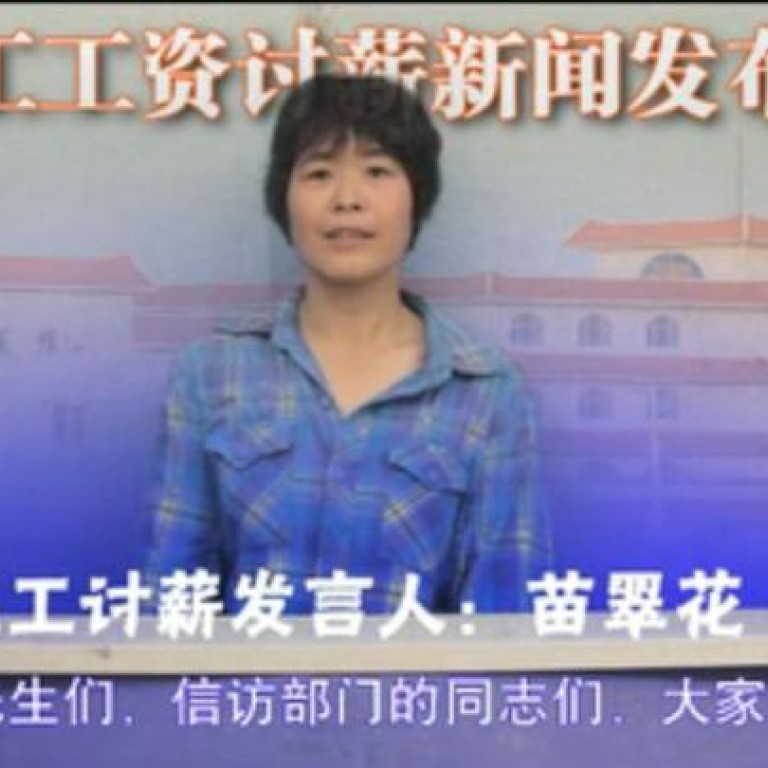
Migrant workers use internet 'press conferences' to fight for back pay
Some workers making creative use of internet to draw attention to their compensation claims
Migrant workers pursuing bosses for back pay on the mainland have to be creative, given their low odds of success in petitions and lawsuits.

When Quan Wenhua was asked to appear in such a video five months ago to ask her former boss' business partner to come up with her back pay, she did not expect to become famous. All she knew was that it might help her get the 20,000 yuan (HK$24,800) she was owed.
She is one of more than 100 workers who have been waiting for four years to be paid for their part in building a cemetery in Tianjin's Hangu district in 2007 and 2008. Their employer, contractor Hei Jinhe, said he was unable to pay them because he had not received payment from the developers - the local funeral affairs administration and an associated company.
In order to get the money, Hei took a friend's advice and decided to make a video and put it on the internet in the hope of arousing public attention.
When the video finally created an online stir at the beginning of this month - prompting media inquiries - Quan was busy harvesting corn and peanuts in her hometown in Xincai county, Henan .
In the four-minute video, Quan, using the pseudonym Miao Cuihua, stammered out an imitation of a foreign-ministry spokesman's speech, urging the Hangu Funeral Affairs Administration to pay 13.8 million yuan to Hei - 3.5 million yuan of which was owed to his workers.
Hei said he and the workers were "locusts stuck on the same rope" and that Quan would not get her money until he got his.
To increase the heat on Hangu's Civil Affairs Administration, which oversees the funeral bureau and on October 10 denied the accusations in the video, a friend of Hei's arranged for Quan to show up at a real press conference in Beijing on October 19.
She was so scared that she was unable to utter a word for the first minute. "I am just an ordinary migrant worker. I work, make money and live a simple life. I just want my money," she told reporters.
The organiser, a Beijing-based cameraman friend of Hei's who produced the video, said Quan was very reluctant to be in the video or the real press conference, but she did it because it might help.
He said Quan did not know how to read many of the characters in the speech, or even what the foreign ministry was.
The cameraman said Hei was desperate after taking all reasonable measures available to him. A Tianjin court ruled in 2010 that the funeral affairs administration and its associated company should pay him 12 million yuan, but the verdict was ignored and petitions in Tianjin and Beijing proved fruitless.
According to the judgment of the Tianjin Higher People's Court, provided by Hei, the funeral bureau disagreed with its associated company regarding the investment in the cemetery when the project was finished in June 2008, and had thus failed to pay Hei's company.
Professor Wang Xiangqian, a China Law Society expert on labour law, said that Quan and her fellow workers should have filed a complaint to the local labour supervision department, which was authorised to check Hei's company's financial status and enforce payment.
But many workers did not know that labour supervision departments existed, because they were understaffed and poorly advertised, he said.
"Apparently the government attaches more importance to protecting investors than to spending on building up a better labour-supervision team."
Exposing the problem on the internet had helped, Hei said. The Tianjin court summoned him, the district Civil Affairs Bureau, the funeral affairs administration and its associated company for mediation last Wednesday. "The chief judge promised me that the case would definitely be solved soon," Hei said.
Believing that her efforts might bear fruit this time, Quan went to her cousin's home in Tianjin to wait for her money, instead of going home after the Beijing press conference.

